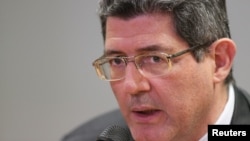Fitch Ratings downgraded Brazil's government bonds to junk on Wednesday, citing rising concerns about an economic and political crisis that threatens to push President Dilma Rousseff from office and scuttle efforts to close a gaping fiscal deficit.
Fitch downgraded Brazil to BB+ with a negative outlook less than 24 hours after the left-leaning Rousseff moved to loosen next year's budget targets. That undercut her orthodox finance minister, who staked his reputation on an austerity agenda now stalled in Congress.
Brazil's currency and dollar-denominated bonds tumbled amid forced selling after the country's second downgrade to junk in three months, further clouding the outlook for an economy suffering from the sharpest downturn in a quarter-century.
Investors barred from owning junk bonds could dispose of about $20 billion in Brazilian sovereign and corporate debt after two ratings agencies have stripped Brazil of its prized investment grade, analysts at JPMorgan Securities estimated in October.
Fitch said a political crisis had restricted the government's ability to right the economy. Rousseff's opponents have accused her of breaking budget rules and are trying to impeach her, while key allies are threatening to bolt her coalition amid a widening bribery scandal at state-run oil company Petrobras.
"The impeachment proceeding is a setback," Shelly Shetty, Fitch's head of Latin American sovereign ratings, told Reuters after the downgrade. "Impeachment delays implementation of fiscal measures."
The Supreme Court on Wednesday was weighing the legality of impeachment proceedings against Rousseff after Congress packed a special committee with the president's opponents in a secret ballot last week.
Lower house Speaker Eduardo Cunha, who started the impeachment proceedings, was one of many lawmakers whose homes and offices were raided Tuesday in the Petrobras probe, which has thrown Congress into disarray and delayed debate of key economic reforms.
Finance minister's plans
Following the downgrade, Finance Minister Joaquim Levy said losing the investment grade rating was "serious" and showed the government had not done everything required. He was silent when asked whether he would stay on as finance minister.
Levy set out to win back investor confidence this year with an unpopular austerity agenda but has faced fierce resistance from congressional allies and ministerial rivals, raising expectations for his resignation.
Earlier Wednesday, Levy said he felt "slightly sidelined" by Rousseff's decision to water down a crucial fiscal savings target for next year.
His comments and the Fitch downgrade added to market pressure from a widely anticipated U.S. interest rate hike on Wednesday, which has drawn investors away from riskier emerging markets like Brazil in recent months.
The Brazilian real fell about 2 percent in Wednesday trading. Dollar-denominated bonds also tumbled sharply, and five-year credit default swaps rose 28 basis points to 482, according to data from Markit.
"Local rates and currency will be under pressure in the next couple of days because of forced selling by index funds," said Bernd Berg, director for emerging markets strategy at Societe Generale.
Standard & Poor's cut Brazil's rating to junk in September, and Moody's Investors Service put the country on review last week for a possible downgrade to that level.
Fitch's downgrade of the sovereign credit rating worsens the outlook for large corporate borrowers already contending with the rising borrowing costs, said Alberto Gallo, head of global macro credit strategy at Royal Bank of Scotland in London.
Downgrades could drive up borrowing costs for large-scale borrowers such as iron ore company Vale SA and Petroleo Brasileiro SA, as Petrobras is known. The nation's largest banks may also face higher borrowing costs.
This year, global bond offerings by Brazilian companies have plummeted 82 percent to about $5.7 billion, according to Credit Suisse Group AG data. Brazil has accounted for less than 9 percent of Latin American global debt offerings this year, down from 32 percent in 2014.





